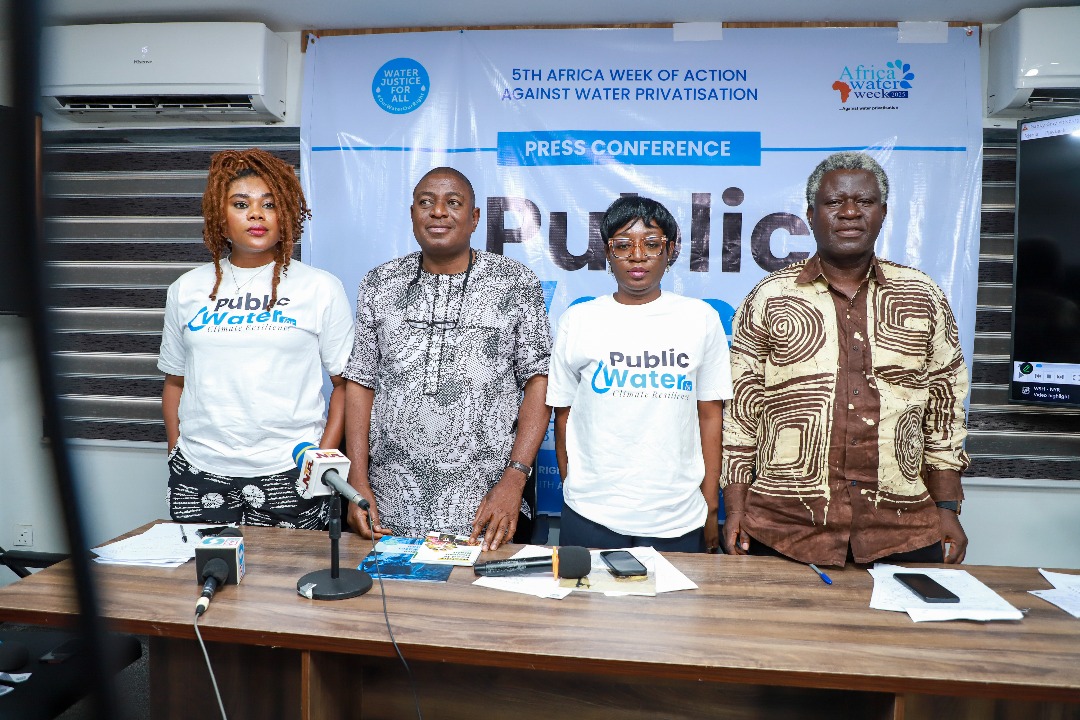Civil society groups, labour unions, and global advocates have renewed calls for governments across Africa to halt the creeping privatisation of water systems, warning that the trend threatens both human rights and climate resilience.
wThe charge came on Monday as the 5th Africa Week of Action Against Water Privatisation kicked off in Lagos. The week-long campaign is convened by the Our Water Our Right Africa Coalition, OWORAC in partnership with the Africa Make Big Polluters Pay, MBPP Coalition, and hosted by Corporate Accountability and Public Participation Africa, CAPPA.
The 2025 observance, with the theme; “Public Water for Climate Resilience,” brings together grassroots movements, community networks, and labour unions from across the continent and beyond. The coalition insists that access to safe and affordable water is a human right that must remain in public hands.
Welcoming participants, Akinbode Oluwafemi, Executive Director of CAPPA, said the partnership between OWORAC and MBPP marks a milestone in recognising the inseparable link between water justice and climate justice.
“To privatise water in an era of escalating climate shocks is to compound vulnerability and institutionalise inequality,” Oluwafemi said.
He noted that water is often the first and most visible victim of climate change through droughts, floods, and rising temperatures. Yet, instead of strengthening public systems, he said governments are succumbing to pressure from private actors to commodify water for profit.
“While nature cries for justice, capital smells opportunity,” he warned. “Multinational corporations now peddle desalination and other privatisation schemes as climate solutions, selling back to us the very water that belongs to the people.”
Oluwafemi commended the presence of Mr. Pedro Arrojo-Agudo, the United Nations Special Rapporteur on the Human Rights to Safe Drinking Water and Sanitation, describing his participation as evidence that the struggle for equitable water systems is global.
Delivering the press text on behalf of OWORAC, Sefa Ikpa, CAPPA’s Programme Officer for Water Campaigns, said the continent’s worsening climate shocks should be a wake-up call for governments to invest in strong, publicly governed water systems, not to hand them over to corporations.
She cited the growing promotion of desalination plants as a “climate-proof” solution but noted that such projects are energy-intensive, fossil-fuel dependent, and environmentally destructive.
“Desalination produces toxic brine that pollutes marine ecosystems and further dispossesses coastal communities,” Ikpa said. “In Tunisia, desalinated water costs up to three times more than reservoir water, with energy alone accounting for 40 percent of the cost.”
Ikpa warned that private control of water undermines resilience, excludes poor communities, and deepens inequality. “Climate resilience will not be delivered through privatisation schemes that entrench exclusion,” she declared. “It will only be built through strong, transparent, and publicly accountable systems that protect water as a common good.”
The OWORAC statement urged African governments to reject loan conditions from international institutions that promote privatisation and to channel sustained public financing into water infrastructure powered by renewable energy. It also encouraged the adoption of indigenous, community-led water management systems as sustainable, low-cost alternatives.
In his solidarity message, Neil Gupta, Water Campaign Director at Corporate Accountability (USA), condemned multinational corporations and Global North governments for profiting from water privatisation across the Global South.
“Defending water is defending life itself,” Gupta said. “Privatisation shifts the priority from universal access to maximising corporate profit. It leads to tariff hikes, job cuts, and environmental damage.”
He cited examples of U.S., U.K., and French state-backed corporate interference in African water systems. According to him, U.S. government-backed water projects in Lagos, World Bank pressure in Kenya, and France’s partnerships with companies like Veolia and Suez expose a disturbing pattern of neocolonial exploitation.
“Global North governments are entangled with the water privatising industry,” Gupta said. “Building communities’ and workers’ power is the only counterweight to these corporate takeover schemes.”
Addressing participants, Pedro Arrojo-Agudo reaffirmed that water must be recognised as a common good and not a commodity. He announced that he would present his report on democratic water governance to the United Nations General Assembly this week, highlighting the dangers of public-private partnerships and financialisation in water management.
Arrojo-Agudo traced the origins of water commodification to the policies of the 1970s and 1980s—from Chile’s Pinochet-era privatisation, to Thatcher’s England, and the French public-private partnership model later exported globally.
He warned that these models often allow private operators to maintain control under the guise of shared ownership, shifting all risks to public institutions while guaranteeing profit for corporations.
“They claim governments lack funds for water investment, yet there is never talk of a lack of public funds for the arms race,” he said. “If impoverished families prioritise water daily, then governments must learn from them, water must be treated as the highest priority.”
The UN expert commended Colombia’s new law supporting community aqueducts through public-community partnerships, describing it as a model for democratic water governance.
“It is written water,” Arrojo-Agudo said, quoting an Italian anti-privatisation movement, “but you must read democracy.”
The Africa Week of Action Against Water Privatisation runs from October 13 to 18, 2025, featuring coordinated actions, public discussions, and advocacy campaigns across several African countries.
Signatories to the OWORAC declaration include CAPPA (Nigeria), Revenue Mobilisation Africa (Ghana), Senegalese Water Justice Network (Senegal), African Centre for Advocacy (Cameroon), Biodiversity and Biosafety Association of Kenya, and Corporate Accountability (USA), among others.

